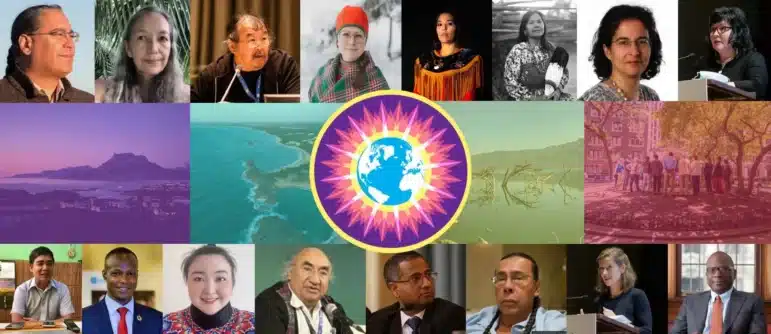
“Spirituality Is Life”: CEE Launches “Freedom to Be” Report
“Indigenous spirituality is not a compartmentalized religious act. It is an ongoing, relational way of living—connecting to land, water, community, our ancestors and future generations.”
Carson Kiburo, executive director of Jamii Asilia Centre in Kenya and member of Kenya’s Endorios Peoples, captured a guiding insight of Center for Earth Ethics’ new report, “Freedom to Be: Dialogues on Freedom of Religion or Belief for Indigenous Peoples.” CEE launched the report on April 29 with an online forum that also featured Dr. Albert Barume, UN Special Rapporteur on the Rights of Indigenous Peoples, Dr. Nazila Ghanea, Special Rapporteur on Freedom of Religion or Belief, and Dr. Ahmed Shaheed, former Special Rapporteur on Freedom of Religion or Belief.
Samira Siddique, CEE director of strategic initiatives, summarized the report, and Roberto Múkaro Borrero (Guainía Taíno), CEE strategic advisor and longtime Indigenous rights advocate, moderated. CEE Executive Director Karenna Gore opened and closed the program.
The event—an official side event of the United Nations Permanent Forum on Indigenous Issues—was the culmination of the Freedom to Be dialogue series, sparked by Dr. Shaheed’s 2022 UN report United Nations report on the freedom of religion or belief for Indigenous Peoples. The dialogues convened global Indigenous leaders from 2022 to 2024 to discuss this topic and give their feedback on the special rapporteur’s report.
Indigenous Spiritualities and the Land
Central to the report is a call to reframe freedom of religion or belief to fully include Indigenous spiritual traditions, lifeways and cosmologies. Drawn from the dialogues, the report explores the deep connections among Indigenous spiritualities, land rights and global well-being.
“The result,” says Gore in the report’s introduction, “is a powerful piece of work that conveys profound insights about the social constructs of ‘religion’ and ‘belief’ themselves, as well as the witness and insights of Indigenous communities worldwide who have endured genocide, oppression, discrimination and disrespect of their ways of life.”
Speakers throughout the dialogues and the report launch emphasized that Indigenous spiritualities are not abstract belief systems but embodied traditions that are deeply interrelated with land, waters, ancestors and the more-than-human world. “Spirituality is life,” said Kiburo. “Indigenous spiritualities are living systems that demand protection of sacred lands, cultural practices, languages and ceremonial spaces.”
This is more than a spiritual concern—it is an ecological and human rights imperative. The report argues that protecting Indigenous spiritualities necessarily involves protecting ecosystems and the rights of those who safeguard them. As Kiburo noted, “Our Indigenous teachings offer profound guidance for humanity’s path forward, especially in this time of ecological crisis.”
Indigenous spiritualities are living systems that demand protection of sacred lands, cultural practices, languages and ceremonial spaces.
Carson Kiburo
Recognizing Historical Harm
Participants addressed the enduring legacy of colonial and religious systems that have oppressed Indigenous Peoples and suppressed their spiritualities and cultures. Borrero, speaking of the Taíno Peoples, described how European colonization initiated “an assault on our freedom of religion very early on.” This assault, he said, caused “generational trauma—but I see a continuing return to those values and that cosmovision that once sustained our people.”
Dr. Barume spoke to the root causes of the demonization of Indigenous spiritualities. “It is no coincidence that the spirituality of Indigenous Peoples is among the first to be attacked when occupation or colonization happens,” he said. “It’s because our spirituality goes to the heart of who we are.”
Dr. Shaheed stressed that we must go beyond acknowledging historical and ongoing harms. “We are not simply asking for the recognition of these harms,” he said, “but also to recognize the important benefits that everyone on the planet can gain from ensuring these communities’ rights are protected.”
I see a continuing return to those values and that cosmovision that once sustained our people.
Roberto Múkaro Borrero
Expanding the Framework of Religious Freedom
A recurring theme was how international legal frameworks often fail to recognize Indigenous spiritualities on their own terms. “The report reveals that mainstream legal instruments still fall short,” said Kiburo. “They often fail to understand Indigenous spiritualities outside the mainstream constructs of ‘religion.’”
Dr. Ghanea praised the report for broadening the aperture: “Giving attention to Indigenous Peoples and freedom of religion or belief can transform our understanding of human rights,” she said. “We should seek to understand more deeply—not to flatten freedom of religion or belief to our own approach.”
The CEE report outlines five recommendations to address these gaps and advance Indigenous rights.
Report Recommendations
1. Build trust between Indigenous Peoples and other actors.
2. Create dedicated funding mechanisms.
3. Recognize and compensate Indigenous Peoples.
4. Recognize cultural sovereignty and differences.
5. Expand the conversation to other priorities.
From Dialogue to Action
The report is not the end of this process—it is a tool for continued advocacy, education and transformation. Gore stated that the Freedom to Be dialogues and report have given CEE a roadmap for the work ahead in “honing our thinking and commitments around these issues.”
In closing, she reminded participants of the stakes: “It is not clear whether human beings will come to an understanding about our place in relation to the rest of the natural world—one that will ensure our long-term survival.” Indigenous spiritualities, she said, “have the power to break through political polarization and help us remember how to be in harmony with the life support system of this planet. That is truly the only way that we will really be free.”
As Kiburo affirmed: “Honoring Indigenous spirituality is not only an Indigenous issue. It is crucial for healing our fractured relationship with the Earth and securing planetary health.”
